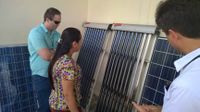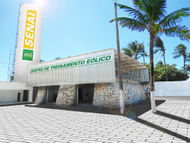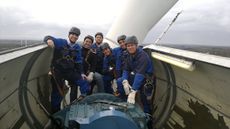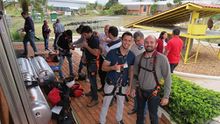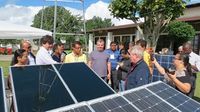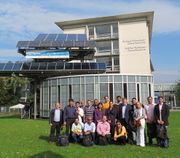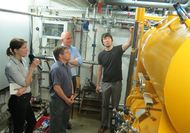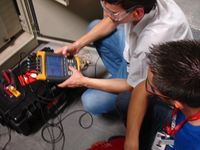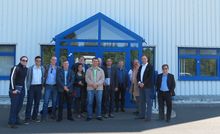Technical Training for Renewable Energies and Energy Efficiency in Brazil
Overview
The Brazilian renewable energy market is getting a boost. Skilled personnel along the whole value chain is required to maintain this upswing and to guarantee the quality of photovoltaic, wind power and solar thermal system installations and their maintenance. This article describes the approach of SENAI, the biggest Technical and Vocational Education and Training institution in Latin America - supported by Deutsche Gesellschaft für Internationale Zusammenarbeit (GIZ) GmbH[1] – in establishing standardized further training programs for renewable energy technologies as well as energy efficiency according to industry needs.
Introduction
Brazil is massively investing in renewable energy (RE). It is estimated that the installed capacity of wind energy will quadruple within 8 years from 5.4 GW in 2014 to 21,4 GW by 2022. The photovoltaic sector is less dynamic but gaining momentum as well with a projection of 3GW to be installed by 2022[2].
The Brazilian TVET (Technical and Vocational Education and Training) system does not yet sufficiently provide graduates for the existing and upcoming demand. Renewable energy and energy efficiency are relatively new topics for the majority of training providers and need to be integrated systematically into the TVET system (initial training as well as further training). Curricula need to be developed and standardized, teachers to be trained, new training centres and laboratories to be build and partnerships with industry established to perform high quality technical training. An important step was taken in this regard by the National Service for Industrial Training (port. Serviço Nacional de Aprendizagem Industrial – SENAI), which is closely linked to the Brazilian Industry Federation (port. Confederação Nacional da Indústria – CNI).
Infosheet: Brazil needs skilled labour in green professions - Brasilien braucht Fachkräfte in grünen Berufen (2015)
In order to support Brazilian partners with the elaboration of comprehensive offers for technical training and professional education in renewable energies and energy efficiency, GIZ applies an integrated approach that considers the necessities of key actors of the energy sector (demand of professionals) and the educational system (supply of professionals). The project promotes the development of standardized training programs on the national level and accompanies the implementation of the new training measures with pilot institutions on the regional and local level.
Training in Wind Power
Two SENAI institutions in the Northeast[3] are preparing to be the first training centers in Brazil to qualify specialized technicians for the wind energy sector. These training programs will focus on
- Operation and maintenance of wind power parks;
- Fabrication and assembly of wind power parks;
- Production and repair of rotor blades.
The cooperation of SENAI with GIZ analyses industry training needs, defines occupational standards and curricula, outlines training center infrastructure and prepares teachers and instructors for the courses that will consist of 20% theory and 80% practical training. The first training programs are supposed to start in 2016.
Infosheet: Technical trainig for wind energy technicians in Brazil - Ausbildung von Windanlagentechnikern in Brasilien (2015)
Nowadays, the share of wind power in the Brazilian energy mix is about two percent. This value is expected to grow up to eight percent until 2020. Good reasons to seek for adequate training offers for wind energy technicians. This Infosheet provides an overview on the results obtained so far by SENAI with regard the introduction of the national itinerary for professional education in wind energy and the specification and set-up of SENAI training centers that will be offering practical training for wind power technicians.
Implementation Requirements Wind Energy Training Centre - Resumo do Projeto Implementação do Centro de Treinamento Eólico (CTEO) (2013)
Training in Solar Power (PV and Solar Water Heating)
In April 2012 the Brazilian Electricity Regulatory Agency, (Agencia Nacional de Energia Elétrica – ANEEL) set the legal framework (ANEEL Resolution N°482[4]) for the use of solar photovoltaic energy systems connected to the electricity grid (→ Net Metering in Brazil). Since then the first bidding process has taken place and the sector is estimated to develop quickly in the next years.
In order to avoid a lack of qualified professionals granting proper and secure installations, TVET institutions need to set up technical training programs for this upcoming sector. SENAI, in cooperation with GIZ, develops occupational standards and prepares the implementation of further training programs with regional training centers.
SENAI teacher training for solar water heating - SENAI Lehrertraining in Solarthermie (2015)
Based on the demand for skilled professionals for the installation and maintenance of solar water heating systems, three professional profiles and the corresponding training courses were developed: The installer (Brazilian qualification level), the supervisor (Brazilian technical level) and the project planner (Brazilian technological level). In order to prepare teachers to implement the new training courses, SENAI and GIZ realized the first training for teachers in solar water heating technology in July 2015.
A training program for teachers in photovoltaics was also realized in July 2015. The course was held at „Casa Ecoeficiente“, a training laboratory for renewable energies of the SENAI association in Paraíba-state. The participating teachers will be responsible to lecture the new courses that will be implemented by pilot institutions from 2016 onwards: Installer of PV systems and supervisor for the installation and maintenance of PV systems.
Tecnical Visit to Germany - Relatório Visita Técnica Energia Solar (2013)
As a first step, SENAI instructors as well as technical staff working closely with industry were sensitized and prepared for their future task during a technical visit to Germany in September 2013. The aim of this visit was to understand how further training programs for the solar sector are organized in Germany and to establish partnerships with German institutions.
The delegation visited the solar school in Freiburg offering specialized courses in photovoltaic and solar cooling / heating, the TÜV Rheinland which operates one of the most advanced laboratories worldwide for testing solar systems as well as the Fraunhofer Institute for Solar Energy Systems ISE, the biggest research institute for solar energy in Europe. Several documents for intended cooperation between SENAI and the visited institutions were signed.
Training in Energy Efficiency
The demand for energy is rapidly increasing in Brazil. Future hydroelectric power generation projects cannot meet the demand for clean energy with low social and environmental impacts. Therefore the efficient use of energy will play an increasing role to avoid bottlenecks in the Brazilian energy supply. The national plan for energy efficiency (port. Plano Nacional de Eficiência Energética - PNEf, 2011) defines an energy savings target of 10% by 2030. Consequently, energy suppliers and private sector start to upraise investments in energy efficiency measures and renewable energies, making the countries electrical system more versatile, decentralized and stable. This emerging reality is causing changes in labor markets, due to growth of demand in specialized knowledge in new electrical systems and energy management practices. Already today, the Brazilian market needs a significant number of qualified professionals able to identify energy saving potentials and subsequently, to plan and implement energy efficiency measures in industry as well as in the building sector.
Infosheet: Creation of professional education programs in energy efficiency - Aufbau eines Berufsbildungsangebots für Energieeffizienz (2015)
The preparation of a curriculum is a widely discussed process that involves a large number of specialists. To start this process it was required to align knowledge amongst participants of the thematic groups. Employees of the main partner in professional education in Brazil, SENAI, took part in technical training, technical visits in German institutions or conducted pilot projects in Brazilian companies with the appropriate professionals tutoring. The infosheet shows first results achieved like the elaboration of national training standards for energy managers in industry as well as the building sector.
National Skills Committee to define Energy Efficiency Training Course - Methodology and approach (2015)
The preparation of the first national Brazilian Energy Efficiency curriculum began in 2015 hosted by SENAI and supported by GIZ. A National Skills and Training Committee brought together experts from major energy industry representatives, such as Schneider Electric, Siemens and ABESCO, experts from SENAI as well as researchers to define the profiles of professionals. Main outcome is the first National Education and Training Curriculum for Energy Efficiency, released by SENAI in December 2015, containing a full description of the professional profile, competencies as well as the teaching content. The training course will prepare engineers and architects as energy efficiency experts for industry as well as for the building sector.
Training of Instructors and Lecturers in Energy Effeciency - Lehrertraining Energieeffizienz Minas Gerais
To guarantee that the institution is prepared to offer the new training courses, a comprehensive training of future lecturers and instructors is offered by SENAI with support of GIZ. Instructors are familiarized with the complete programmatic content, get to know didactic materials and learn how to lead their students during the practical activities and projects with companies.
Tecnical Visit to Germany - Relatório Visita Técnica Eficiência Energética (2014)
A team of trainers and consultants of the regional SENAI departments was chosen to deepen their knowledge in a technical visit to Germany. The agenda of the study visit, organized by GIZ, included the company Rheinisch-Bergische Druckerei GmbH, which recently implemented an overall energy management concept in compliance with the ISO 50001 specification [5]as well as the energy provider Vattenfall, which operates the biggest urban cooling distribution grid in Germany through energy-efficient use of power-heat cogeneration.
Practical Project on Energy Efficiency in Buildings - Relatório de Análise de Eficiência Energética da Edificação do CNI (2014)
A practical project was conducted to qualify technical staff of regional SENAI training centers as instructors in the area of energy efficiency in buildings. The participants realized an energy audit at the national headquarter of the industrial federation CNI in Brasilia. Saving potentials detected (in total approx. 15% of the overall energy use) ranged from switching to another electricity tariff at the electricity provider to internal and external modifications in the architecture of the building, cooling and illumination systems.
Introduction of nationwide TVET in Energy Efficiency for Brazil
SENAI and GIZ organized the first National Technical Committee, which was composed as a technical consulting forum to join all fields involved in energy efficiency, especially regarding the two distinct areas of industrial and building energy efficiency. In order to connect market (companies and government) and educators (institutions and methodology experts), the committee brought together experts from SENAI, researchers, government agencies and major energy industries representatives, such as Schneider Electric, Siemens, ABESCO, UFRJ/COPPE, EcoEficiência and COPEL. The committee’s main goal was to update professional abilities and define profiles that will contribute to employee success and performance.
The main outcome was the first national professional education itinerary in Energy Efficiency, which contains a full description of the employee’s roles and subroles. This description defines a set of professional activities that needs to be performed at a working situation, leading the employee to achieve the expected result of its occupation. To complete the professional profile in this highly complex working ambient, management abilities have to be instructed, that every employee can fully engage in his or her working environment, establish leadership and team relationship and dealing with unpredicted and new situations.
To guarantee that the institution is prepared to offer the new curriculum, the next step is a comprehensive training of future professor and instructors. Professors indicated to teach new or revised subjects must comprehend the complete programmatic content presented, know the didactic material and must be aware of how to lead their students during the practical activities. For example, as a final project, the graduates will have to elaborate a practical energy diagnostic, because in many cases these students will work as an energy consultant for a client or in their company. Professors need to support and monitor what might be their first professional experience in this field, guiding them through the project and fixing suboptimal habits developed along the course or in past careers.
Energy Efficiency Professional careers - Video
The Brazilian Ministries of Education and of Mines and Energy, together with the national Technical and Vocational Education and Training (TVET) provider SENAI and GIZ, on behalf of BMZ, have formed a partnership to lay the foundations of professional education in the field of energy efficiency in Brazil. The main goal is knowledge transfer to partner institutions, including the development of curricula and implementation of courses orientated on demands of the national industry.
Technicians and engineers have already the opportunity to enrol in courses already established in four states. The project support now the partners on the implementation of professional courses in other states.
To publicize it, a short film was produced highlighting professional careers in energy efficiency and offering insights into the typical tasks of professionals from this industry. The film emphasizes the importance of this area for young people seeking further qualification. It was supported by Siemens as well as ThyssenKrupp.
You can watch the video here: https://youtu.be/D2VgFvVi02Q
References
- ↑ As a federal enterprise, the Deutsche Gesellschaft für Internationale Zusammenarbeit (GIZ) GmbH supports the federal German government in achieving its international cooperation objectives. Together, Brazil and Germany face global challenges such as preserving biodiversity and fighting climate change. The German Cooperation for Sustainable Development therefore operates primarily in two areas: Protection and sustainable management of Rain Forests as well as Renewable Energies and Energy Efficiency. Within the cooperation with the Brazilian partners GIZ provides advice on strategy development, support for developing management and cooperation structures, as well as technical expertise.
- ↑ MME 2014: Plano Decenal de Expansão de Energia 2023. http://www.epe.gov.br/Estudos/Documents/PDE2023.pdf (Retrieved on 3-12-2015)
- ↑ The Brazilian Centre for Gas and Renewable Energy Technologies (port. Centro de Tecnologias do Gás e Energias Renováveis – CTGAS-ER), operated by SENAI and Petrobras, and the Centre of Wind Power Training (port. Centro de Treinamento Eólico – CTEO) in Fortaleza, operated by the SENAI department of Ceará state
- ↑ ANEEL 2012: Resolução Normativa No. 482. http://www.aneel.gov.br/cedoc/bren2012482.pdf (Retrieved on 3-12-2015)
- ↑ ISO 50001:2011 is an energy management system model created by the International Organization for Standardization (ISO). It provides a framework of requirements for organizations which imply developing policies for energy efficient use and target setting, data collection and measurement, review and improvement. http://www.iso.org/iso/home/standards/management-standards/iso50001.htm (Retrieved on 1-16-2015)

